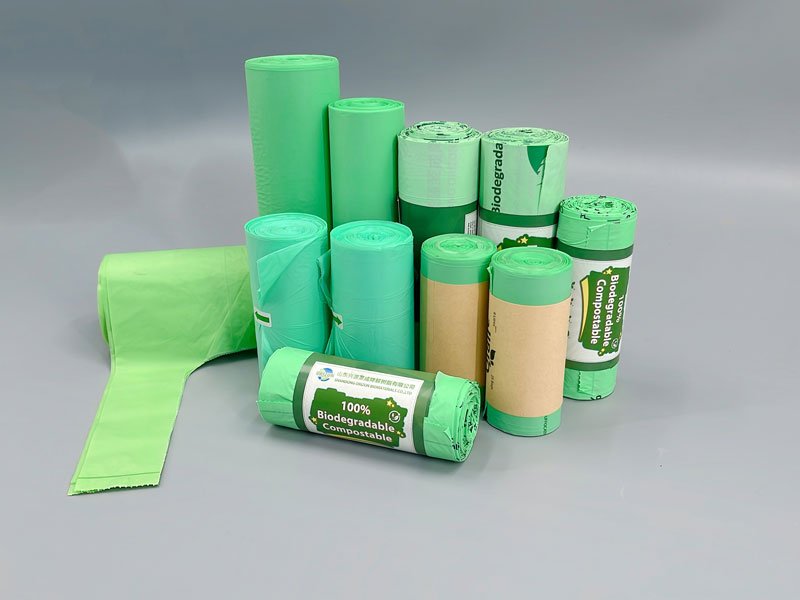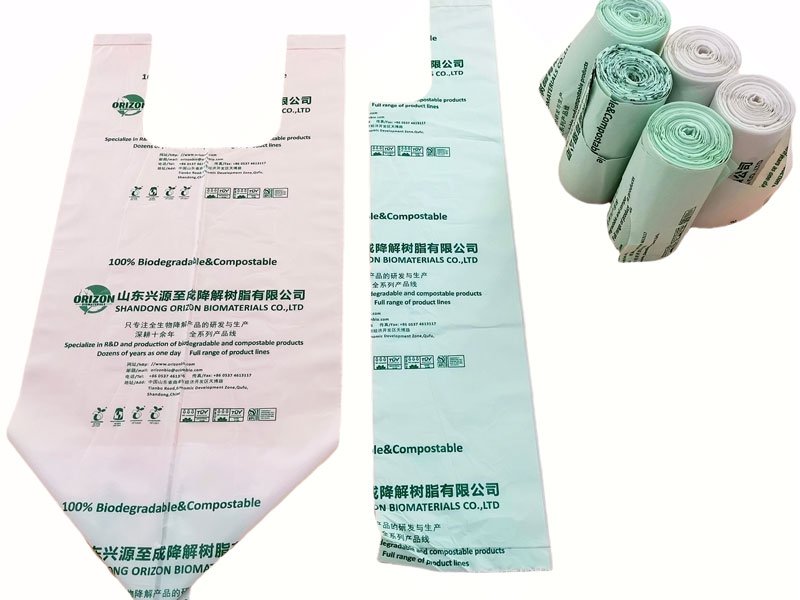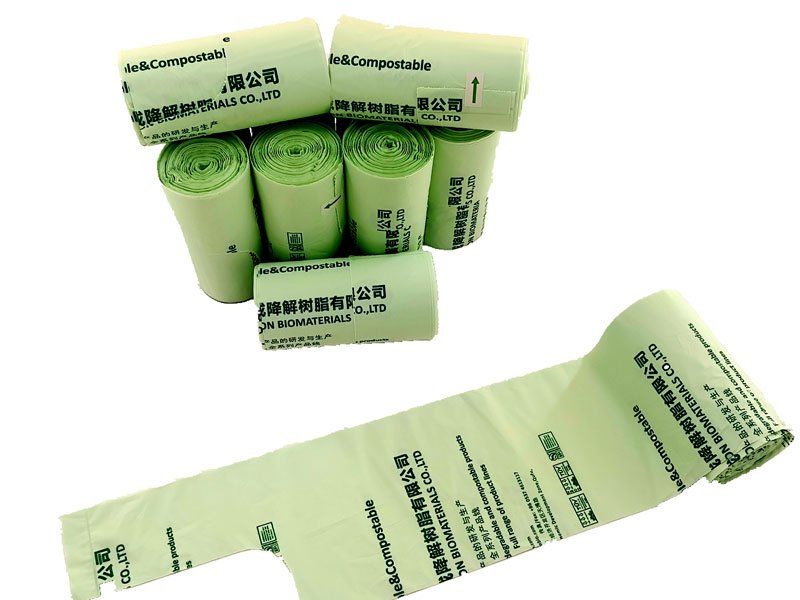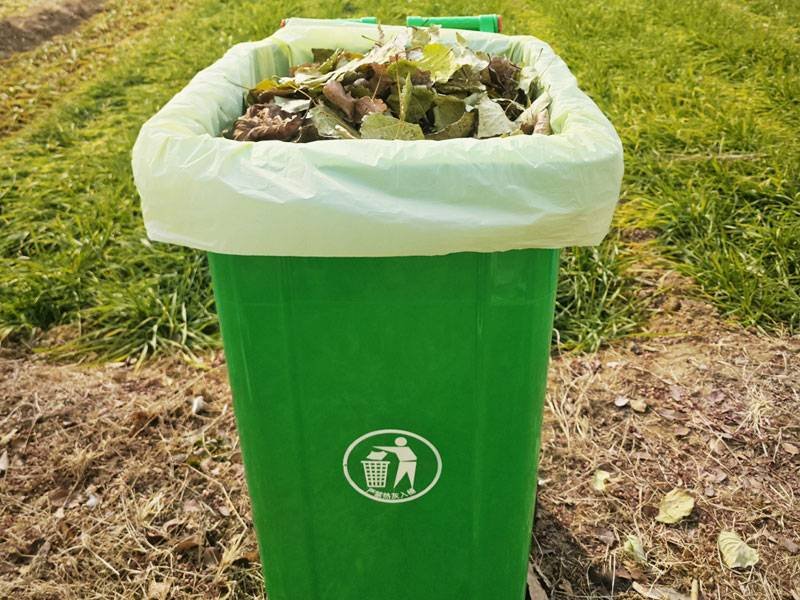As more people look for sustainable solutions to reduce plastic waste, compostable trash bags have become a top choice for environmentally conscious households and businesses. But not all bags labeled "green" or "eco-friendly" are created equal. In this comprehensive guide, we’ll walk you through the best compostable trash bags of 2025, what certifications to look for, and how they differ from biodegradable alternatives.
What Are the Best Compostible Trash Bags
- Certification: Choose trash bags that are certified by the Biodegradable Products Institute (BPI) or TUV Austria (OK Compost Home or Industrial) to ensure they meet compostability standards (e.g., ASTM D6400 certification for commercial composting, or certified for home composting).
- Home vs. Commercial Composting: Many compostable bags require the high temperatures and controlled conditions of a commercial composting facility to break down effectively. Only a few are certified for home composting, which is typically done at lower temperatures.
- Durability: Compostable bags are thinner than traditional plastic bags, so prefer bags with reinforced bottoms or thicker materials (e.g., 0.85-1 mil) to prevent tearing or leaking.
- Intended Use: Smaller bags (2.6-4 gallons) are suitable for countertop compost bins or bathroom/office trash cans, while larger bags (13-48 gallons) are suitable for kitchen or outdoor use.
- Environmental impact: Choose bags made from plant-based materials (e.g. corn starch, sugar cane) that do not contain toxins such as bisphenol A (BPA) or perfluorooctanoic acid (PFOA) and do not produce microplastics during decomposition.
- Storage and use tips: Store bags in a cool, dry place as they may degrade due to moisture or heat. Avoid overpackaging and empty organic waste within 2-3 days to prevent premature decomposition.

Reducing plastic use is crucial. Compostable garbage bags offer a sustainable alternative, breaking down into natural elements without leaving harmful residues. By choosing compostable options, we can decrease plastic pollution and protect the environment.
Top 10 Best Compostable Trash Bags Brands
| Brand | Certification | Sizes Available | Odor Control | Breakdown Time | Best For |
|---|---|---|---|---|---|
| BioBag | BPI, ASTM D6400 | 13, 33 gallon | Moderate | 90–180 days | Kitchen use |
| UNNI | BPI, OK Compost | 2.6, 13 gallon | Moderate | 90–120 days | Food scraps |
| Green Earth | ASTM D6400 | 3, 13 gallon | Yes | 90 days | Pet waste |
| Primode | BPI | 13, 33 gallon | Good | 180 days | Bulk trash |
| ProGreen | BPI, OK Compost | 13 gallon | Yes | 120 days | Home composting |
| Hippo Sak Eco Wave | ASTM D6400 | 13 gallon | Yes | 180 days | Heavy duty |
| EcoSafe | BPI, ASTM D6400 | 13, 30, 33 gallon | Yes | 90–120 days | Commercial use |
| Reli. Eco | BPI | 13, 30 gallon | No | 180 days | Budget-friendly |
| Compostic | Home compostable | 13 gallon | Yes | 90 days | Zero-waste households |
| HoldOn | ASTM D6400, BPI | 13 gallon | Yes | 90–120 days | Food waste bins |
Best Compostable Trash Bags for Home
Finding the right compostable garbage bag depends on your specific needs. Here are some top recommendations:
Best Small Compostable Biodegradable Garbage Bags with Handles
Managing small waste bins can be challenging without the right bags. A durable, compostable bag with handles makes disposal easier and more eco-friendly.
The BioBag 3-Gallon Compostable Bags are ideal for small bins. Measuring 16.3" x 22.0" x 0.67 mil, each roll contains 100 bags with convenient handle straps. They are BPI-certified and suitable for home composting.

These bags are made from plant-based materials, ensuring they break down efficiently in composting environments. The handles provide easy tying and carrying, making waste disposal hassle-free. Their size is perfect for bathroom or office bins, reducing plastic use in every room.
Best Compostable Garbage Bags for Home (100% Biodegradable)
For those seeking fully biodegradable options, it's essential to choose bags that meet strict composting standards.
UNNI 100% Compostable Bags are a top choice. They are BPI-certified and meet ASTM D6400 standards, ensuring complete biodegradation in composting facilities. Available in various sizes, they cater to different household needs.
 Compostable Garbage Bags for Home (100% Biodegradable)
Compostable Garbage Bags for Home (100% Biodegradable)
Contact Us
These bags are made from plant starches and contain no polyethylene, making them an eco-friendly alternative to traditional plastic bags. Their durability ensures they hold up during use, and their biodegradability means they won't linger in the environment.
Cheapest Compostable Trash Bags (3 Gallons)
Budget-friendly options are available for those looking to make an eco-friendly switch without breaking the bank.
Primode 3-Gallon Compostable Bags offer affordability without compromising quality. They are BPI-certified and suitable for home composting, providing an economical choice for small waste bins.

Contact Us
These bags are made from plant-based materials and are designed to decompose efficiently in composting environments. Their cost-effectiveness makes them accessible for households looking to reduce their plastic footprint.
Eco-Friendly Compostable Trash Bags (13 Gallon Compostable Garbage Bags)
Kitchen waste requires sturdy bags that can handle heavier loads without tearing.
For Good Tall Kitchen Bags are an excellent choice. Made from PLA and PBAT, they are 1.1 mil thick, providing durability and leak resistance. They are also Lomi-friendly, breaking down efficiently in composting environments.

Contact Us
These bags feature a drawstring closure for easy tying and carrying. Their strength ensures they can handle kitchen waste without issues, making them a reliable option for daily use.
Best Large Compostable Garbage Bags (for Use in Larger Commercial and Residential Dumpsters Larger than 50L)
Managing waste in larger bins requires bags that can handle substantial volumes without compromising on eco-friendliness.
UNNI 55-Gallon Compostable Large Bags are designed for such needs. Made from cornstarch and PLA, they are BPI-certified and meet ASTM D6400 standards, ensuring complete biodegradation.

Contact Us
These bags are 0.85 mil thick, providing durability for heavy loads. Their large capacity makes them suitable for commercial and residential dumpsters, offering an eco-friendly solution for substantial waste management.
Best Compostable Yard Waste Bags (36 Gallons, 53.1" Long, 35.4" Wide, 22.6" Diameter)
Yard waste disposal can be cumbersome without the right bags. A large, durable compostable bag simplifies the process.
Lawn & Leaf Bags are ideal for yard waste. Measuring 33 gallons, they are made from plant-based materials and are BPI-certified, ensuring they break down efficiently in composting environments.

Contact Us
These bags are designed to handle grass clippings, leaves, and other yard debris without tearing.
How to Choose the Right Compostable Trash Bag
1. Size Compatibility:
- Match the bag size with your bin (e.g., 3 gal for countertop bins, 13 gal for kitchen bins, 33 gal for yard waste).
2. Certification:
- Ensure the bag has valid certifications like BPI, ASTM D6400, EN13432, or OK Compost.
3. Thickness & Strength:
- Look for bags labeled “leak-proof” or “tear-resistant.” Compostable bags are generally thinner than plastic ones, so durability matters.
4. Use Case:
- Compostable liners work great for food waste, but not all are ideal for wet or heavy waste. Choose based on your needs.
5. Price per Bag:
- Compare unit pricing. Buying in bulk or wholesale compostable bags often saves money.
Where to Buy Environmentally Friendly Garbage Bags
Online Retailers:
- Amazon
- Grove Collaborative
- Eco-friendly eCommerce stores
Physical Stores:
- Whole Foods
- Target
- Zero-waste or refill shops
Wholesale / B2B:
- Alibaba (for bulk orders)
- Compostable bag manufacturers (e.g., Orizon Biomaterials)
Tips for Using Compostable Trash Bags Correctly
- Store in a cool, dry place. Heat and humidity can break down materials prematurely.
- Use within 12–18 months. These bags have a shelf life.
- Don’t overfill. They may tear if overstretched.
- Do not put in regular trash bins. Compostable bags should go to composting facilities or in your backyard compost if they are “home compostable.”
Compostable vs. Biodegradable Trash Bags: What’s the Difference?
| Feature | Compostable | Biodegradable |
|---|---|---|
| Breaks down into | Water, CO2, biomass | Microplastics or biomass |
| Timeframe | 90–180 days | Varies (months to years) |
| Certification | ASTM D6400, EN13432 | Often unregulated |
| Safe for composting | Yes | Not always |
Biodegradable trash bags may degrade eventually, but not all are suitable for composting. They often require industrial conditions or leave microplastics behind.
Compostable garbage bags are the better option if you want an eco-friendly, zero-waste lifestyle.
Why Use Compostable Trash Bags?
- Environmental Impact: These bags break down into organic matter without toxic residue, reducing reliance on landfills.
- Composting Support: Ideal for collecting food scraps and yard waste for municipal or backyard composting.
- Plastic-Free Living: Supports a zero-waste or low-impact lifestyle.
- Compliance: Many cities now mandate compostable bags for organic collection bins.
The Correct Disposal Method of Compostable Trash Bags
Proper disposal of compostable trash bags is crucial to ensure they break down as intended and provide environmental benefits.
1. Home Composting
If the bag is certified for home composting (e.g., TÜV Austria OK Compost Home), you can add it to your backyard compost bin. Ensure the compost pile maintains appropriate moisture, aeration, and temperature to facilitate decomposition.
2. Industrial Composting Facilities
For bags certified for industrial composting (e.g., ASTM D6400, BPI Certification), dispose of them through municipal composting programs or facilities that accept compostable plastics. Check with your local waste management services to confirm acceptance.
3. Avoid Landfills and Recycling Bins
Do not dispose of compostable bags in regular trash destined for landfills or in recycling bins. Landfills lack the conditions necessary for compostable bags to break down properly, and they are not suitable for recycling streams.
4. Community Composting Programs
If home composting isn't an option and local industrial composting facilities are unavailable, consider participating in community composting programs or drop-off sites that accept compostable materials.
By selecting certified compostable trash bags and disposing of them correctly, you contribute to reducing plastic waste and promoting sustainable waste management practices.
FAQ
Are compostable trash bags better than biodegradable ones?
Yes. Biodegradable bags may break down into microplastics, while certified compostable bags fully degrade in compost conditions.
Can compostable trash bags be used in regular trash bins?
Yes, but they are most effective when used for organic or compostable materials.
Do they break down in landfills?
Not efficiently. Compostable bags require oxygen, moisture, and microbial activity—conditions that landfills lack.
How do I store compostable trash bags?
Keep in a cool, dry place. High humidity or heat can cause premature degradation.
Are these bags suitable for pet waste?
Yes, especially those with odor control and leak resistance.
Conclusion
Switching to certified compostable trash bags is one of the easiest and most impactful steps you can take toward reducing plastic pollution. Whether you need compostable bin liners for your kitchen, office, or garden, the options in 2025 are more reliable and affordable than ever.
By choosing plant-based garbage bags with trusted certifications, you’re supporting a cleaner, more sustainable future.





